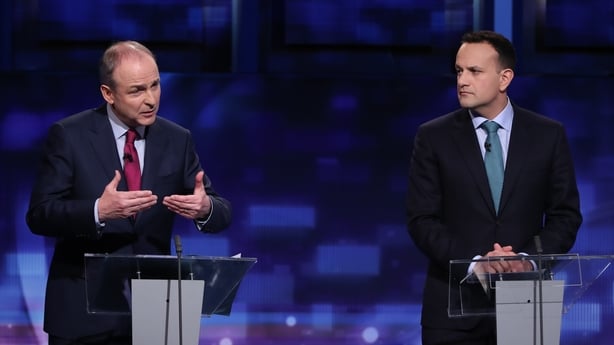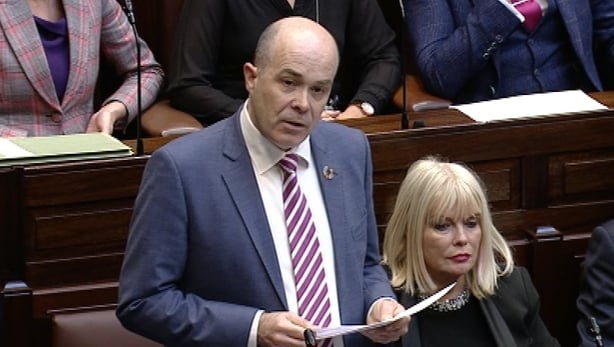In the aftermath of the formation of the last administration in mid-2020, The Western People newspaper described Micheál Martin and Leo Varadkar's ministerial selections as amounting to "a Cabinet fit for Cromwell".
Prompted by the decision not to hand the reins of a government department to any TD from Connacht or several adjoining counties, a blistering editorial spoke of "a shameful monument to regional imbalance".
It was a view shared widely.
When we spoke to voters on the streets of Galway and Mayo at the time, many felt their areas and their concerns were being left out, or left behind, when it came to top-level decision making.

This might not necessarily be the case - the government is supposed to act for all the people and in the national interest but it's an argument that can be easily made and one that is difficult to rebut. The perception can be more damaging than the reality.
This time around, the involvement of several Independent TDs from the west of Ireland at both "super junior" and Minister of State level should assuage such commentary.
The remembered fallout from 2020 may also boost the chances of senior ministerial office for some Fianna Fáil or Fine Gael deputies from west of the Shannon too.
"The voter likes the idea that the politician is available too."
Whatever the ultimate make up of the next Cabinet, there’s no doubting the desire of voters to have their voices heard in the corridors of power.
In that respect, and at this point in time, the role of Independent TDs is noteworthy.
The head of the Department of Government and Politics at UCC, Dr Liam Weeks, is the author of 'Independents in Irish Party Democracy’, an examination of the role played by non-party TDs over the decades.
Dr Weeks says consistent polling since the 1960s shows voters’ main motivation is to select someone who will look after the needs of their constituency.
"If you don’t do that, you won’t get elected. That’s the same in every part of the country. People often like to portray a Dublin/rural dichotomy but I don’t get that. The culture that’s central to Irish politics is common across the country.
"The voter likes the idea that the politician is available too," he says.
That’s a view shared by former minister Denis Naughten. He has experienced life as a TD in both a party setting and as an Independent.
He left Fine Gael after the party rowed back on commitments not to downgrade Roscommon Hospital which were made before the 2011 election.

But while the banner under which he traded changed, there was no difference in what he felt voters expected of him.
"I think that expectation is pretty much universal. In terms of what the voters want, there was no change," he says.
Dr Weeks says the profile and appeal of Independents began to rise from the late 1990s onwards, "when Bertie Ahern had to rely on four of them: Harry Blaney, Mildred Fox, Jackie Healy-Rae and Tom Gildea - and giving them the deals he did added to their appeal, because they were able to argue they had far more influence than party backbenchers".
Nature of agreements with non-party TDs evolved and changed
Five years after Denis Naughten left Fine Gael, he was himself in government and at the Cabinet table, after topping the poll in Roscommon-Galway as an Independent and agreeing a deal to assist his former party back into office.
Reflecting on that time, he describes it as a "watershed" in terms of government formation. Non-party TDs were playing an active role in office, as opposed to supporting an administration from afar, in return for the side-deals that typified previous agreements.
He sees similarities between that scenario and the one that was agreed with Independents this week.
"Enda Kenny was absolutely adamant that he wanted people in government not doing side deals, so I had no more influence than any other minister, but no less influence either.
"I got no special treatment and that seems to be the approach on this occasion as well because the independents are being brought into government.
"But the reality is that if you are around that Cabinet table, you have a significant amount of influence and access to senior officials in other government departments" he says.
"They have sharp political minds and they're proof that all politics is local in Ireland."
Independent TDs at the top table
Dr Weeks says this aspect is important, given the relatively recent trend of having Independent TDs at the top table.
"We have one of the most government-dominant systems in Europe, so being a minister is a big deal and that’s historically why Independents didn’t do well.
"The difference with Bertie Ahern’s administrations is it wasn’t strictly a deal with the government, it was a personal deal with Bertie Ahern and [Charles] Haughey did the same.
"It was a personal arrangement, whereas now Independents are real players in the decision-making. For them to play the strong role in government is new."
Additionally, Dr Weeks believes that as soon as the election results were known in early December, it made sense from both Fianna Fáil and Fine Gael perspectives to do a deal with the Independent groupings.
"They’re not going to jump out of bed over a particular policy, they’re far easier to do a deal with.
"These are all shrewd operators, guys like the Healy-Raes, Grealish, Lowry… they’d all get re-elected regardless of who they stood for.
"They have sharp political minds and they’re proof that all politics is local in Ireland."







